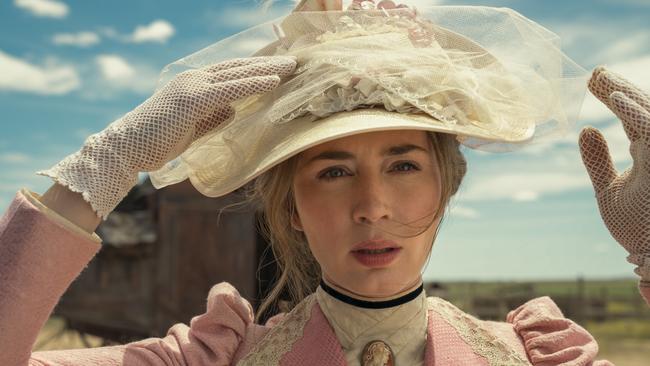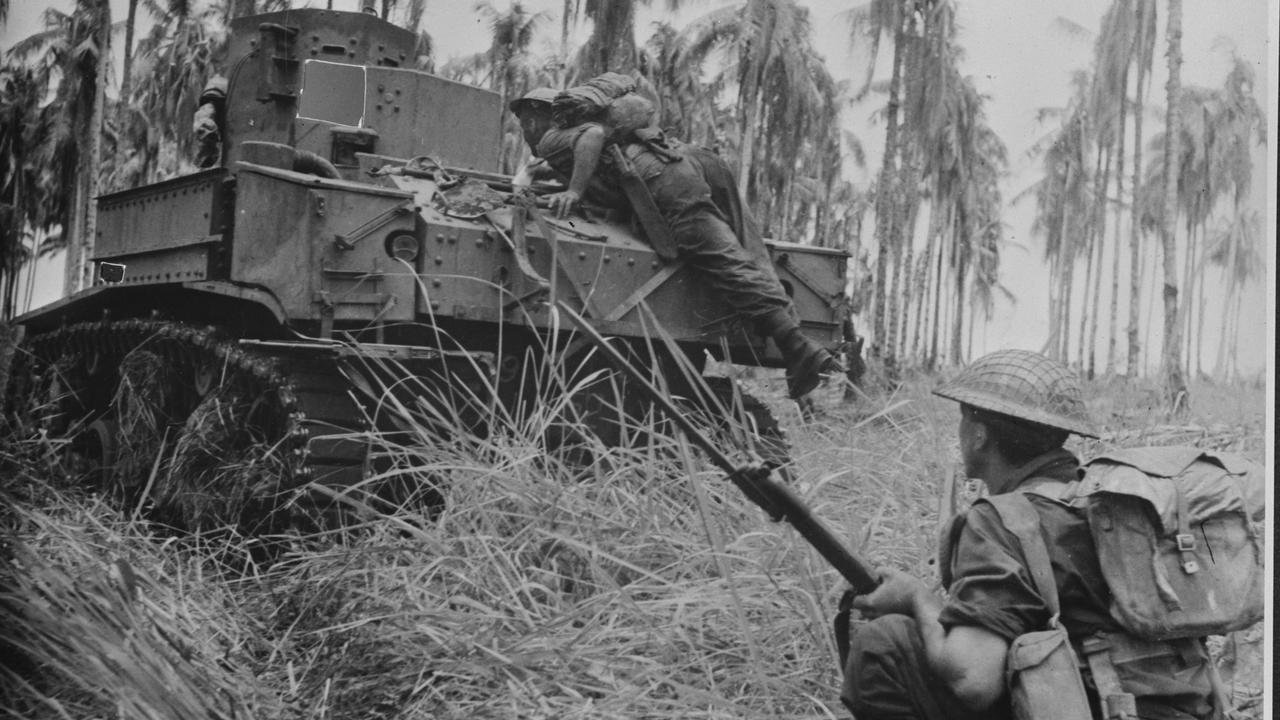Old west drama makes for sexy TV: review of The English
Emily Blunt is an English aristocrat displaced and apprehensive in the barren and violent Wild West in Hugo Blick’s The English

“Woody Allen wrote to me saying, ‘Good luck with your horse opera’ which I thought was funny,” writer director Hugo Blick says in a recent interview with critic Stuart Jeffries. “But he’s right. It is an opera, a place of heightened emotions in a mythical space. That’s what the best westerns have always been.”
He’s talking about The English, his highly intelligent, wonderfully immersive reconsideration of the revisionist western, quite unexpected from the BBC of all places, with a woman and a man of colour as the drama’s protagonists.
And as created, written and directed by Blick, it presents a graphic portrayal of violence quite opposed to the more bloodless and acrobatic deaths many of us grew up with in that era when cowboy and Indian shows proliferated on TV. They sold us a myth in which their male heroes were peacekeepers between the belligerent individualism of the old west and the newfangled values of the settled town, nostalgic eulogies for the American Dream.
The tragedy suffered by Native Americans was disregarded and trivialised in favour of the romantic, magnanimous cowboys, figures of popular escapist fantasies, and those exciting shootouts and horseback chases. Then the genre became self-conscious, reflecting a shift in the cultural attitudes of the time. And the TV western disappeared, until quite recently. Now it’s hot again.
Back in 2004, David Milch reinvented the sanitised classic western of swinging saloon doors, ten-gallon hats and quick draw shootouts to explore the reality of the unruly frontier in the scabrous Deadwood. He created a western that was about people improvising the structures of governance in an environment that was the revocation of everything but brute force.
Blick, who loves the western as much as Milch, also provides a wonderfully-cast parade of grasping tyrants and manic outlaws, fortune-seekers and drifters struggle towards some sense of common cause. But his narrative is more linear. Blick gives us a revenge pursuit thriller set in 1890, on the cusp of the frontier’s closure.
And it’s a beguiling story which is as much a narrative about race and class as it is about the archetypal patterns of the western and its embodiment of fantasies of heroism overcoming evil figures of authority.
“It tells the story of an Englishwoman and a Native American man,” he says. “In very different ways but to equally devastating effect both have been stripped of their identities. United, each reveals strengths the other lacks but together they have a chance to avenge themselves against their loss. So much as it’s a quest for reclamation, it’s a love story.”
Emily Blunt is Lady Cornelia Locke, an English aristocrat displaced and apprehensive in the barren and violent Wild West, gorgeously and inappropriately dressed, though she soon finds a large carpetbag full of cash.
Hers is a wonderfully nuanced performance, played with dignity, and a kind of modern derring-do; she is more than handy with a bow and arrow, gun and a knife.
“You want to rape me,” Cornelia tells Ciaran Hinds’ evil, moustachioed hotelier Richard Watts in the opening episode, as she sits in a striking red frock he has forced her to wear for his delectation, gazing unhappily at a plate of six fine prairie oysters (actually bull testicles).
“I’m realistic when it comes to issues of consent,” he sneers. “Then f--k a horse,” she says.
Blunt has that rare star personality who also happens to be a superb character actor.
And Chaske Spencer is Eli Whipp, an imposing, mournful, psychically distressed Native American, a former scout for the Army. The actor is himself from the Pawnee Nation and grew up on several reservations. He says he largely built his character drawing on the accounts of veterans who had served in Vietnam, Afghanistan and Iraq, believing the sardonic, taciturn soldier would have experienced similar experiences with PTSD.
Eli’s Pawnee name is Wounded Wolf and his army handle, Sergeant Eli. He’s a proud man aware of the inevitable passing of the old order of things but still with his own demons with which to contend as the barbaric advance of European civilisation evicts him and his people from their ancestral lands. Spencer’s performance is a marvel of understatement and timing, a gritty grandeur about him worthy of any great western actor, his voice mellifluous and soothing.
Blick is one of the more interesting figures in contemporary British TV, making his name a little paradoxically, given what came later, with the 2000 mockumentary comedy Marion and Geoff. In 2011, his seven-part BBC policier The Shadow Line, starring Chiwetel Ejiofor and Christopher Eccleston confused us all; a tightly wound BBC noir conspiracy thriller, a gorgeously theatrical, arty, claustrophobic, infuriating, pretentious and vastly entertaining piece of hard boiled crime drama.
In 2014, he made another BBC drama, The Honourable Woman, an award-winning spy thriller starring Maggie Gyllenhaal as an Anglo-Jewish woman, set against the backdrop of government paranoia and espionage. Then in Black Earth Rising, Michaela Coel starred as a Rwanda-born British lawyer embroiled in the prosecution of a warlord, whom her white adoptive mother is indicting for war crimes.
But The English seems more personal to Blick. In interviews he tells how he was sent out as a young man to Montana, and experienced “the last dust in the rear view of the truck of the Old West”. Working as a wood cutter for the government he was often in Native communities, a difficult and salutary lesson.
And “the ghosts of the harshness of the frontier of the 1890s still haunted the place, at least for me”.
Set in Wyoming and Kansas, but unable to shoot in the US due to Covid restrictions, the series took place in Spain, specifically in parts of Toledo and Avila. Much of it was filmed on a vast beef farm outside Madrid and it’s clear that Blick delighted with the grasses, rock formations and horizontal light. He says his crew shot all the time in the afternoons to get that slanting light of the golden hour, something he says he learned from Clint Eastwood.
And Blick and cinematographer Arnau Valls Colomer have created a visually opulent drama that is simply something in which to luxuriate, with its echoes of the movies of not only Eastwood but John Ford, George Stevens, John Sturges, Akira Kurosawa and the extravagant film language of Sergio Leone’s spaghetti westerns.
The first episode “What You Want & What You Need” begins with an elegiac monologue from Locke, set 13 years after the main story. “Without you I’d have been killed right at the start,” she says of Eli. “That’s how we met, that’s why we met; it was in the stars and we believed in the stars, you and I.”
Suddenly it’s 13 years earlier in 1890. Eli witnesses the death of a wanted Indian who had led the Fetterman battle in 1866, the site of the US Army’s worst defeat by Plains Indian groups with the exception of the Battle of Little Big Horn, and prevents the death of his wife and child. An old comrade chases after him, the former scout travelling north to Nebraska where he was born. He wants to use the Homestead Act to get more land after his long army service. He’s warned though: “In there you have been one of us but out here you are one of them.”
Locke arrives by stagecoach at the loneliest hotel in the west, a surreal building straight out of a Sergio Leone flick and observes in the distance Eli Whipp heavily hogtied and strung up because he disrespected Watts, the hotel’s owner.
From here the plot violently explodes, guns go off, knives are thrown, ambushes are staged; as a well-planned plot to kill the wild English rose is thwarted and she and Eli escape into the country on horseback. It’s a superb opening, magnificently choreographed, Blick effortlessly establishing a world that is violent, treacherous and corrupt.
Blick, with some devotion really, adheres to the basic formula of the western, one dating back to James Fenimore Cooper, dealing with the settlement of the American wilderness and the archetypal pattern of the adventure story.
There are last minute escapes and spectacular arrivals, fierce and unexpected, departures of the hero and even the journey of the wagon train across the plains.
The episode structure is organised as a sequence of chases, pursuits, captivity and narrow escapes, including the reversal of roles where the hunted becomes the hunter. Cinematically Blick juxtaposes a series of almost idyllic set pieces with abrupt, often disturbingly violent action scenes, interposed with almost laconic narrative passages contained in some lovely dialogue sequences.
He is often referred to by UK critics as a “show now, explain later” creator, and parts of The English are a little unfathomable, even disorienting, but it’s a series in which every moment still tantalises with its intelligence and visual beauty.
The English, streaming on Prime Video.




To join the conversation, please log in. Don't have an account? Register
Join the conversation, you are commenting as Logout